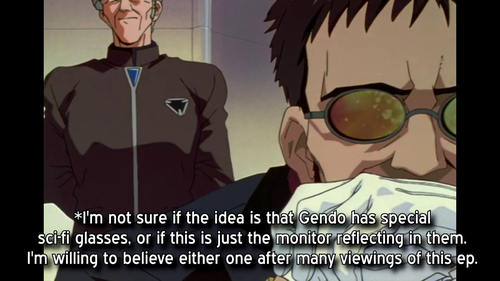2016-12-02
How changing times can change our interpretation of what we see
Through a complicated chain of conversation, I recently wound up watching Digibro's "10 Killer Cuts in Evangelion Ep. 1" (via). Starting at 03:04 in that video, Digibro discusses one of his choices and, well, let me show you what startled me here with a frame from Digibro's video:

(full-sized, and Digibro
primarily discusses this scene assuming that they are special sci-fi glasses)
According to his MAL profile, Digibro was born in 1991, which means that he probably first saw Neon Genesis Evangelion in the late 00s or maybe even in this decade. Even in the late 00s, glasses with electronic displays were not a particularly extreme idea and they'd probably shown up in a number of 00s anime shows, as well as being demonstrated and talked about in real life. By this decade, of course, the technology was far enough along that Google Glass could be offered as a high-end consumer item. Someone watching anime today could reasonably 'read' (aka interpret) a scene like this as showing such fancy smart glasses in action.
But Neon Genesis Evangelion was made in 1995 and first seen then, when even the idea of such glasses was relatively far out of the mainstream (much less the real-world technology). Almost no one seeing Neon Genesis Evangelion in 1995 would have read this scene as showing a futuristic heads-up display instead of being the reflection of the giant display screens on Gendo's mundane sunglasses, and it's very likely that the mundane explanation is what was intended by Gainax; otherwise they probably would have been far more explicit about showing us that Gendo's glasses were very special in both this scene and others.
Times have changed, though. A reading that was obvious in 1995 is no longer obvious now; the environment that we the audience exist in has changed our assumptions about what we see. And if smart glasses wind up becoming common, the 'smart glasses' reading will only become more and more the likely assumption of future audiences. They will have to be explicitly reminded that although Neon Genesis Evangelion is futuristic, it was created in the past and so its vision of the future does not match reality.
All of this makes me think, primarily about hidden assumptions.
I'm sure that Neon Genesis Evangelion is not the only show affected by being watched well after its creation and in a different environment, with an audience that makes different assumptions about 'obvious' things that we're seeing. Sometimes what we don't get in such shows is obvious and clearly out of place (which can be interesting), but sometimes it's not at all; our assumptions that we understand what we're seeing and are correctly interpreting it are just silently off.
(There are other little elements in Neon Genesis Evangelion that are quietly drifting out of place. One that comes to mind is how the cellphones are apparently there mostly just for voice calls.)
PS: Making assumptions is both necessary and assumed by the show's creators. One of the purposes of putting in familiar things, using familiar settings, and so on is that you can rely on the audience to understand them without having to take the time to explain them; instead you only have to cover any deviations from the normal (or from genre cliches that the audience will also assume).